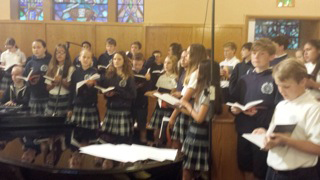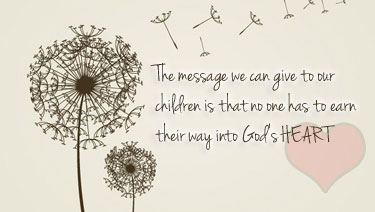
Kids who are in preschool or kindergarten have the beauty of being unfettered in a complex world. If you’re a kid, you’re part of the mix. It doesn’t matter if you speak well, can run quickly or need a wheelchair. Kids at this age are accepting of all others. Hey, if you’re a kid, you can play and that’s all that matters.
It was Jesus who said, “Let the little children come to me,” and for good reason! In their simplicity, their joy and wonder at all of life, their pure hearts and ability to live fully in the present moment, young children are as close to God as anybody.

— Renee Laporte
All of that seems to change with maturity and awareness. Age eight tends to be when children notice difference and as children get older the differences become even more pronounced. They notice skin color, socio-economic status, ability, and they begin to notice their own successes and failures.
This is a tender age of learning self-acceptance and peer acceptance. And this is a wonderful time to discuss differences. All differences.
In our Catholic faith, we believe that “God makes no mistakes”. It is central to our belief that every life is sacred and holy. We all belong. When children begin to point out difference, this is the moment to pause and really have the conversation that explains differences and the value of each and every person. Here is where you can begin teaching and modeling self-acceptance and peer acceptance. Recognizing the holy in every person means recognizing that our challenges and our gifts come in many different packages.

We are all holy.
We all matter.
Running fast, drawing well, solving equations quickly are all accomplishments and students in the middle grades begin to value these achievements. They notice when others surpass them and they notice when they are surpassing others. This can begin a feeling of being in competition with one’s peers. Our culture works to increase the feeling of competition. Our country values speed, efficiency, intellect, and achievement over the important (and some could say much more profound) qualities of careful discernment, contemplative compassion or kindness.
This is the moment where we can become “counter cultural” and work to teach children the value of cooperation over competition.
We, as parents, can recognize the value of “process over product” and work to have children see the joy and pride in personal growth rather than the folly of comparison to others.
All children are valued. All children matter.
The message we can give to our children is that no one has to earn their way into God’s heart. God loved you the moment you were conceived. He doesn’t care how fast you run or how quickly you can recite your times tables. He loves you simply because you are the only you ever to grace the planet.

You are irreplaceable.
You are miraculous.
Yes, you.
And so is that annoying sister.
And your classmate that has difficulty hearing.
And your friend who can’t run very well at all.
Each of these people is sacred and holy, just like you.
God asks us over and over again to love our neighbor as ourself.
He asks us to value every body.
He asks us to see the sacred holiness in every person…which means there are no first place trophies or last place disappointments.
Only miracles.
Every single one of us.



